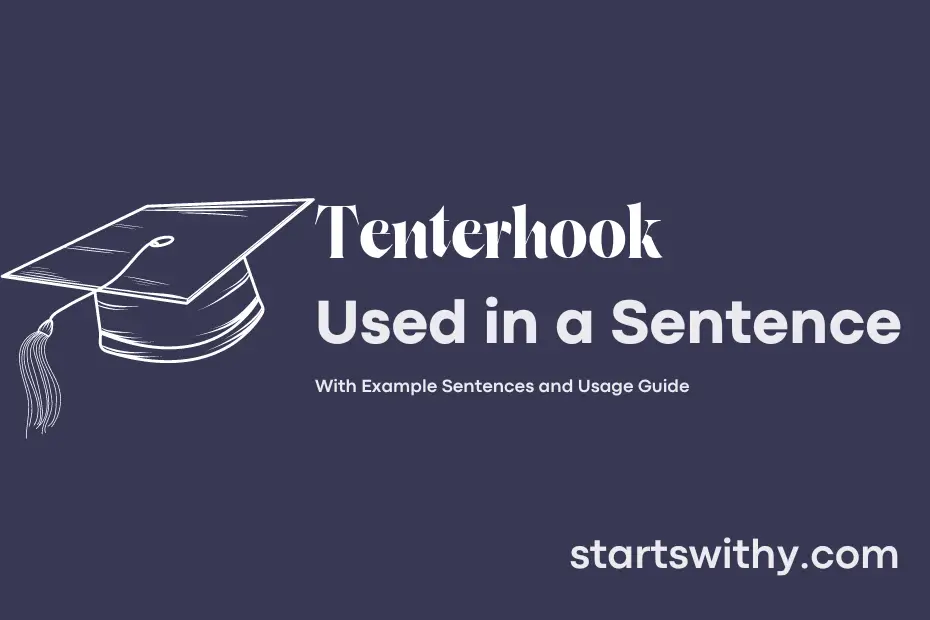Have you ever been on tenterhooks waiting for news or results? The term “tenterhooks” refers to a state of suspense, anxiety, or uneasiness while waiting for something uncertain or important.
Derived from the hooks used to stretch newly woven cloth over a tenter frame to dry and set the weave, being on tenterhooks captures the tension and anticipation of being in a suspenseful situation.
7 Examples Of Tenterhook Used In a Sentence For Kids
- My coat got caught on a tenterhook.
- Be careful not to sit on a tenterhook.
- The old lady’s dress was hanging on a tenterhook.
- Do not touch the sharp tenterhook.
- The bird’s nest was tangled in a tenterhook.
- The spider web was hanging on a tenterhook.
- The ribbon got stuck on a tenterhook.
14 Sentences with Tenterhook Examples
- Tenterhook is a word that often appears in English literature courses.
- The upcoming final exams had everyone on tenterhooks.
- Students waiting for their internship offers are on tenterhooks.
- The suspenseful conclusion of the novel left us all on tenterhooks.
- As the deadline for project submissions neared, students were on tenterhooks.
- The guest lecture by the renowned professor had students on tenterhooks.
- Waiting for the exam results had everyone on tenterhooks.
- The intense debate competition had participants on tenterhooks.
- The announcement of the annual college fest lineup had everyone on tenterhooks.
- Students eagerly awaiting the start of the new semester were on tenterhooks.
- The anticipation of the upcoming sports tournament had players on tenterhooks.
- The stress of making decisions about their career paths left many students on tenterhooks.
- The delay in the issuance of hall tickets had exam-going students on tenterhooks.
- The announcement of the group project partners had students on tenterhooks.
How To Use Tenterhook in Sentences?
To use Tenterhook correctly in a sentence, you need to understand its meaning and how to incorporate it effectively. Tenterhook refers to a state of suspense, tension, or anxiety, often while waiting for a particular outcome.
Here are some tips on using Tenterhook in a sentence:
-
Make sure to use Tenterhook as a single word and not as part of a phrase or sentence.
-
Position Tenterhook before a preposition or punctuation mark to convey the feeling of anticipation or nervousness in the sentence.
Example: “She was on tenterhooks, waiting for the results of her exam.”
- Remember to use Tenterhook in situations where there is a sense of uncertainty, anxiety, or anticipation present.
Example: “As the final seconds of the game ticked away, the fans were on tenterhooks, hoping for a last-minute goal.”
- Try to use Tenterhook in a creative and descriptive way to enhance the impact of your sentence.
Example: “The news of his promotion left her on tenterhooks, eagerly awaiting the details of their move.”
By following these tips, you can effectively incorporate Tenterhook into your sentences to convey a sense of suspense or anxiety.
Conclusion
In conclusion, the phrase “on tenterhooks” is commonly used to convey a state of suspense, anxiety, or anticipation. It expresses the feeling of being on edge or filled with nervous excitement as you await a certain outcome or decision. The term originates from the practice of hanging cloth on tenterhooks to stretch it out, likening the tension and sense of uncertainty to the feeling of being suspended or caught.
When someone is on tenterhooks, they are often eagerly awaiting news, updates, or results that will determine future actions or outcomes. The term vividly captures the mix of anticipation and tension that can accompany uncertain situations, making it a vivid and relatable expression for many people experiencing suspenseful moments.



